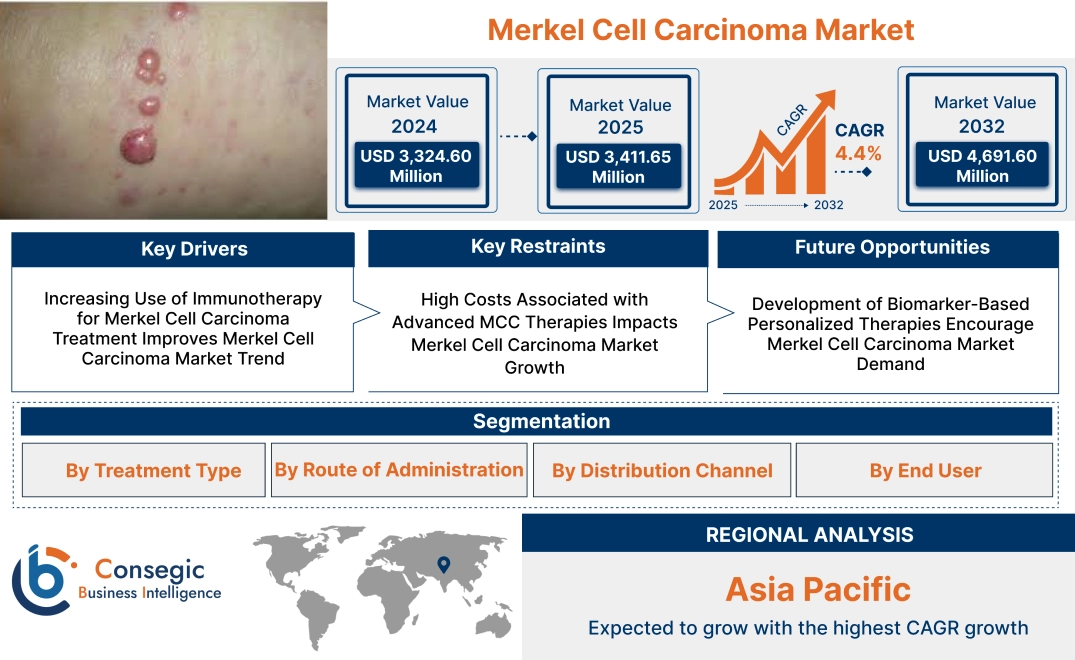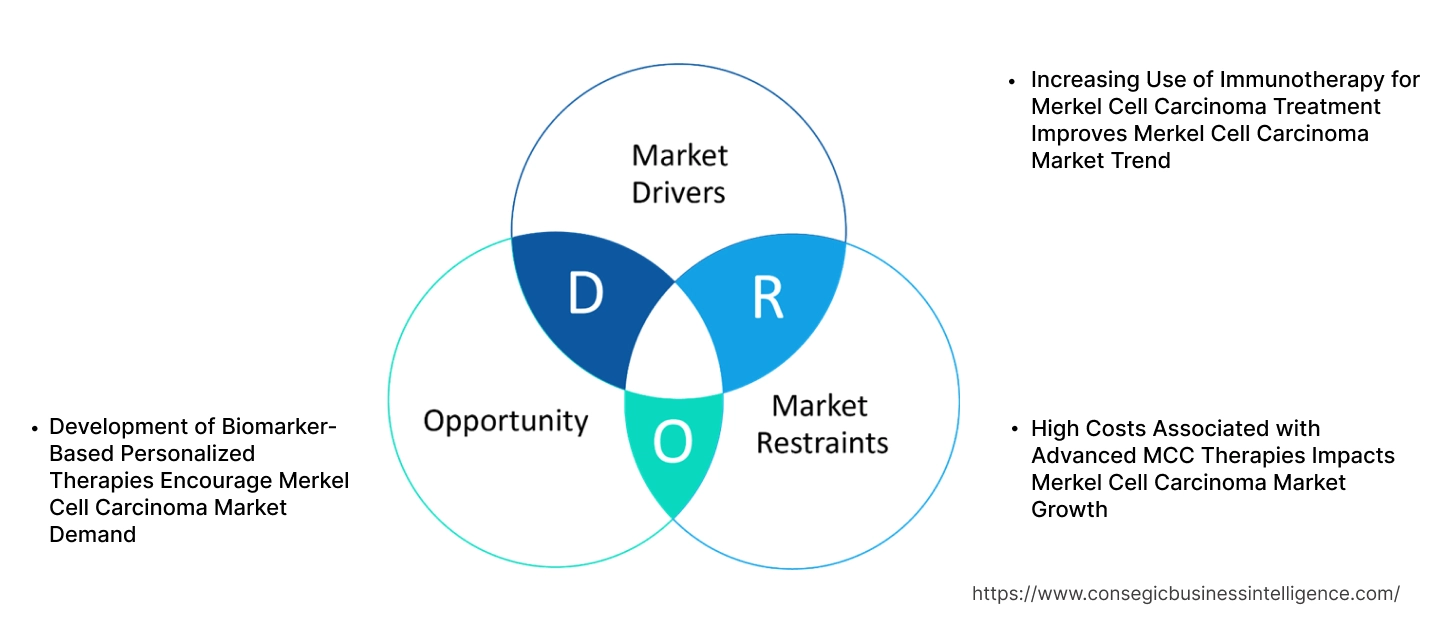Merkel Cell Carcinoma Market Size:
Merkel Cell Carcinoma Market size is estimated to reach over USD 4,691.60 Million by 2032 from a value of USD 3,324.60 Million in 2024 and is projected to grow by USD 3,411.65 Million in 2025, growing at a CAGR of 4.4% from 2025 to 2032.
Merkel Cell Carcinoma Market Scope & Overview:
Merkel Cell Carcinoma (MCC) is a rare and aggressive form of skin cancer that originates in the Merkel cells, which are responsible for sensory functions in the skin. This cancer primarily affects older adults and individuals with weakened immune systems. MCC is characterized by rapid tumor growth, often presenting as a painless, firm, and shiny nodule on the skin. Early detection and prompt treatment are crucial for improving survival rates. Treatment options include surgery, radiation therapy, and immunotherapy.
The market for MCC is driven by the rising number of cases and advancements in treatment methods. Key applications include the development of targeted therapies, immunotherapies, and diagnostic techniques. MCC treatment and research are pivotal in the healthcare industry, particularly in oncology and dermatology sectors.
Merkel Cell Carcinoma Market Dynamics - (DRO) :
Key Drivers:
Increasing Use of Immunotherapy for Merkel Cell Carcinoma Treatment Improves Merkel Cell Carcinoma Market Trend
Immunotherapy, particularly immune checkpoint inhibitors, has transformed the treatment landscape for Merkel cell carcinoma (MCC). These therapies harness the immune system to identify and destroy cancer cells. For instance, pembrolizumab and avelumab have been approved for MCC treatment due to their efficacy in improving survival rates and reducing recurrence. Clinical trials have shown that these immunotherapies achieve durable responses in patients with advanced MCC, unlike conventional therapies that often fail to prevent disease progression.
The expanding use of immunotherapy for MCC significantly enhances patient outcomes, driving its adoption and boosting the merkel cell carcinoma market demand.
Key Restraints:
High Costs Associated with Advanced MCC Therapies Impacts Merkel Cell Carcinoma Market Growth
The cost of advanced treatments for MCC, such as immunotherapy and targeted therapies, remains a significant barrier for many patients and healthcare systems. Immune checkpoint inhibitors, while effective, are expensive and require long-term administration. For example, the annual cost of pembrolizumab therapy often exceeds $150,000 per patient, making it inaccessible to a large portion of the population, especially in low- and middle-income countries. This financial burden also affects healthcare providers and insurers, limiting the widespread adoption of these therapies.
Thus, the high costs associated with advanced MCC treatments pose a substantial challenge to merkel cell carcinoma market growth.
Future Opportunities :
Development of Biomarker-Based Personalized Therapies Encourage Merkel Cell Carcinoma Market Demand
The future of MCC treatment lies in the development of biomarker-based personalized therapies. These therapies aim to identify specific genetic or molecular markers in patients to tailor treatments for better outcomes. Ongoing research focuses on biomarkers such as PD-L1 expression and tumor mutational burden, which are critical in predicting patient responses to immunotherapy. Advances in precision medicine and companion diagnostics are expected to refine treatment protocols and improve the efficacy of targeted therapies for MCC.
The emergence of biomarker-based personalized therapies offers a promising merkel cell carcinoma market opportunity in the coming years.
Merkel Cell Carcinoma Market Segmental Analysis :
By Treatment Type:
Based on treatment type, the Merkel Cell Carcinoma (MCC) market is segmented into immunotherapy, chemotherapy, combination therapy, and others.
The immunotherapy segment accounted for the largest revenue in merkel cell carcinoma market share in 2024.
- Immunotherapy utilizes the body’s immune system to target and combat cancer cells, making it a prominent treatment for MCC.
- The increasing adoption of immune checkpoint inhibitors, such as pembrolizumab and avelumab, has significantly contributed to the revenue share of this segment.
- These therapies provide durable responses and improved survival rates compared to conventional treatments, making them highly preferred in MCC management.
- The segment’s dominance is further supported by ongoing clinical trials and regulatory approvals for new immunotherapeutic agents.
- The expansion of biomarker-driven immunotherapies is expected to increase the overall efficacy and uptake of immunotherapy in treating MCC.
- Therefore, according to merkel cell carcinoma market analysis, immunotherapy’s ability to enhance treatment outcomes and its integration into standard care protocols solidify its position as the largest revenue-generating segment.
The combination therapy segment is anticipated to register the fastest CAGR during the forecast period.
- Combination therapy involves using multiple treatment modalities, such as immunotherapy and chemotherapy, to maximize therapeutic outcomes.
- This approach aims to tackle cancer’s heterogeneity, improve response rates, and delay resistance development, which is crucial in MCC management.
- The growing emphasis on personalized medicine has led to the development of tailored combination regimens, further driving its adoption.
- The increase in clinical evidence supporting the benefits of combination therapies will contribute to the rapid expansion of this segment.
- Combination therapies are expected to provide more comprehensive responses, particularly in patients with advanced or metastatic MCC.
- Thus, according to merkel cell carcinoma market analysis, combination therapy’s versatility in addressing complex cases and its potential to deliver superior efficacy underpin its rapid trend trajectory.
By Route of Administration:
Based on the route of administration, the market is segmented into oral and parenteral.
The parenteral route segment accounted for the largest revenue in merkel cell carcinoma market share in 2024.
- Parenteral administration, including intravenous and intramuscular injections, ensures rapid drug delivery and higher bioavailability, making it the preferred choice for MCC treatments.
- Most approved immunotherapies and chemotherapy agents for MCC are administered parenterally, contributing to this segment’s dominance.
- This route is especially critical for advanced or metastatic MCC cases requiring immediate therapeutic action.
- Parenteral administration also ensures precise dosing and immediate availability, which is crucial in emergency care for MCC patients.
- This route remains the standard for critical care scenarios due to its established reliability and fast onset of action.
- Therefore, the efficacy and reliability of parenteral administration in delivering treatments secure its position as the leading segment by revenue, fueling the merkel cell carcinoma market expansion.
The oral route segment is anticipated to register the fastest CAGR during the forecast period.
- Oral administration offers convenience, reduced hospital visits, and better patient compliance compared to injectable therapies.
- Advancements in drug formulation technologies are enabling the development of effective oral treatments for MCC.
- This segment’s trend is further fueled by the increasing focus on homecare settings and patient-centered care.
- Oral treatments provide patients with greater autonomy in managing their condition and reduce healthcare costs.
- The introduction of innovative oral therapies is likely to drive adoption, particularly in early-stage MCC management.
- Thus, according to market analysis, the oral route’s potential to simplify treatment protocols and improve adherence supports its projected rapid growth.
By Distribution Channel:
Based on the distribution channel, the market is segmented into hospital pharmacies, retail pharmacies, and online pharmacies.
Hospital pharmacies accounted for the largest revenue share in 2024.
- Hospital pharmacies play a critical role in MCC treatment by ensuring the availability of specialized drugs and supporting their administration under medical supervision.
- The high dependence on hospital settings for parenteral therapies and critical care further bolsters this segment’s dominance.
- These pharmacies are also pivotal in handling advanced immunotherapies and combination regimens, which require strict monitoring.
- Hospitals ensure access to multidisciplinary care and advanced technologies for comprehensive MCC treatment.
- The centralization of MCC treatment within hospital settings supports the consistent demand for specialized therapies.
- Therefore, according to market analysis, hospital pharmacies’ central role in delivering specialized care and ensuring drug availability makes them the largest revenue-generating channel.
Online pharmacies are anticipated to register the fastest CAGR during the forecast period.
- Online pharmacies provide a convenient and cost-effective platform for accessing medications, especially for patients in remote areas.
- The increasing penetration of e-commerce and digital healthcare platforms is driving the growth of this segment.
- Additionally, the availability of discounts and home delivery services enhances their appeal to patients managing chronic conditions.
- The rising adoption of telemedicine services and remote consultations supports the shift toward online pharmacies.
- Online pharmacies are also increasingly offering personalized services, further boosting their popularity.
- Thus, according to market analysis, the shift towards digital health solutions and the growing preference for convenience fuel the rapid demand of online pharmacies.
By End User:
Based on end-user, the market is segmented into hospitals, homecare, specialty centers, and others.
The hospital segment accounted for the largest revenue share by 36.50% in 2024.
- Hospitals are primary centers for MCC diagnosis, staging, and treatment, offering comprehensive care under one roof.
- The availability of advanced facilities for administering immunotherapies and combination regimens reinforces their dominance.
- Hospitals also provide multidisciplinary care, including oncology, dermatology, and surgery, essential for MCC management.
- The presence of specialized medical professionals and equipment ensures optimal treatment outcomes.
- Hospitals are often the first choice for aggressive treatment regimens and advanced interventions in MCC care.
- Therefore, according to market analysis, the hospital segment’s ability to provide integrated and advanced care cements its status as the largest revenue contributor.
The homecare segment is anticipated to register the fastest CAGR during the forecast period.
- The increasing focus on patient-centric care and advancements in portable medical devices are driving the adoption of homecare services for MCC management.
- Homecare settings support oral therapies and follow-up care, reducing the burden on hospitals and improving patient convenience.
- The growth of telemedicine and remote monitoring further facilitates the trend of this segment.
- Patients increasingly prefer homecare options to minimize hospital visits and receive more personalized attention.
- The rising availability of home-based services and technologies makes homecare a more feasible option for MCC patients.
- Thus, homecare’s alignment with the evolving preferences for personalized and convenient healthcare services positions it as the fastest-growing segment, driving the merkel cell carcinoma market expansion.
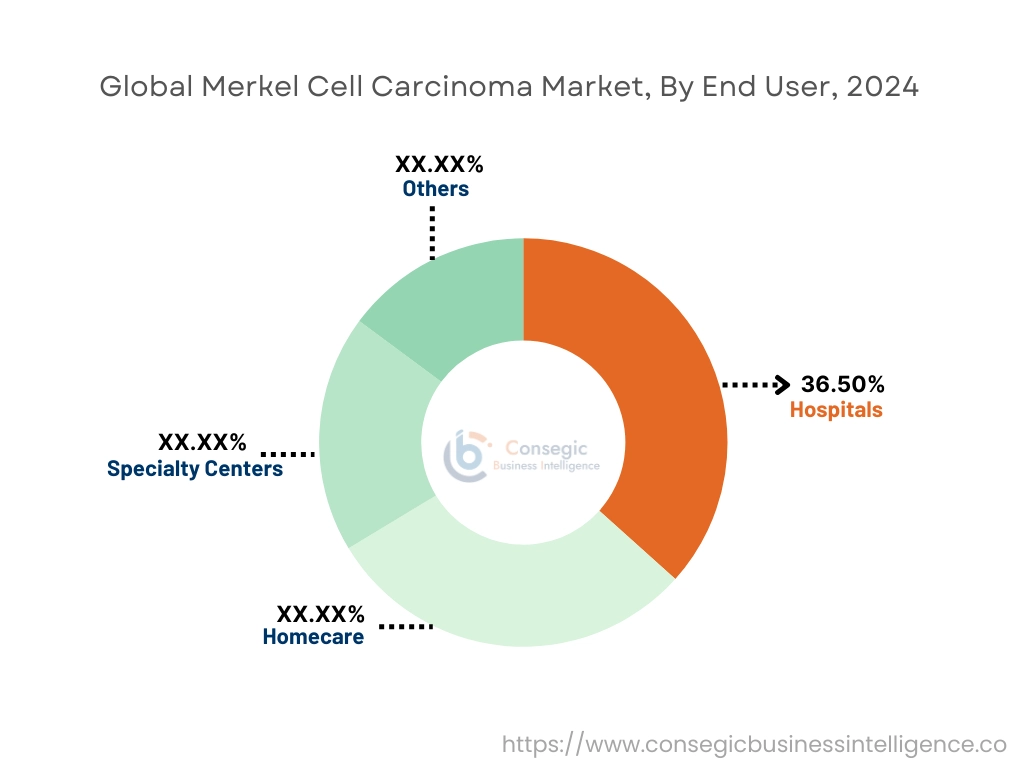
Regional Analysis:
The regional segment includes North America, Europe, Asia Pacific, Middle East and Africa, and Latin America.
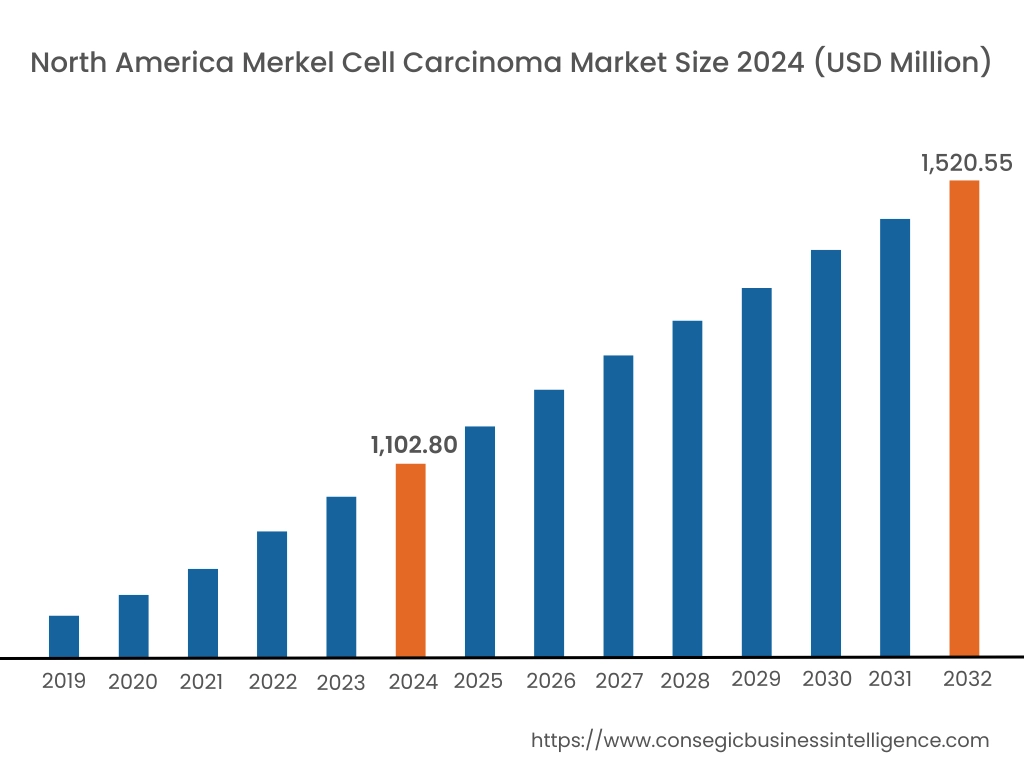
In 2024, North America was valued at USD 1,102.80 Million and is expected to reach USD 1,520.55 Million in 2032. In North America, the U.S. accounted for the highest share of 71.60% during the base year of 2024.
North America is the leading region in the Merkel cell carcinoma (MCC) market. The United States holds the largest share, with advanced healthcare systems and extensive research in immuno-oncology. The FDA’s approval of novel therapies for MCC has contributed to the availability of effective treatments. Increasing awareness of rare cancers, coupled with a strong presence of key market players, further strengthens the market. However, high treatment costs and access issues in rural areas remain challenges. Canada also shows potential with growing investment in cancer research and healthcare infrastructure.
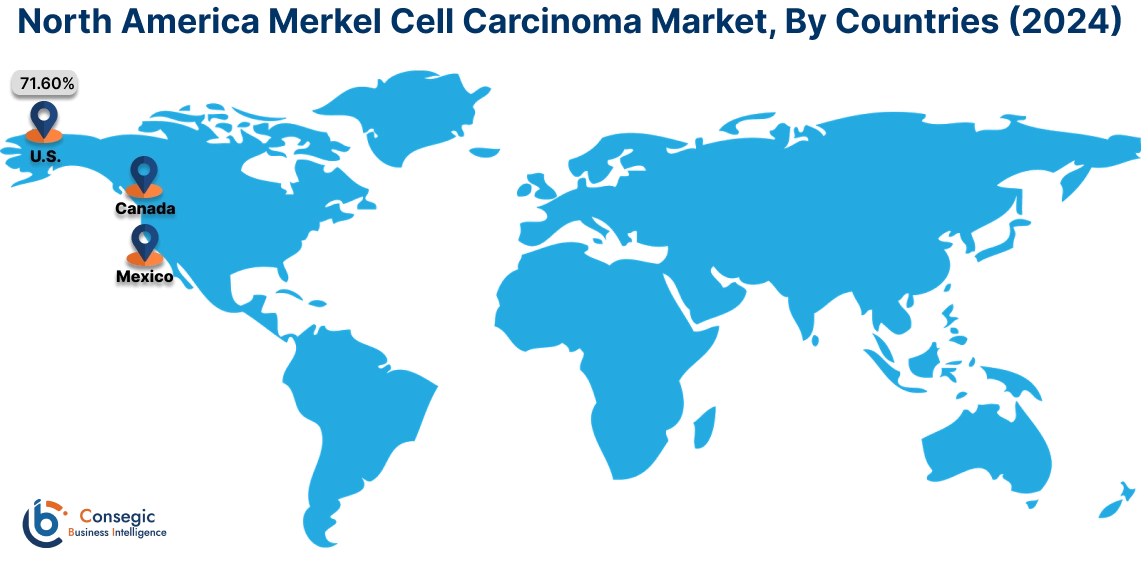
In Asia Pacific, the market is experiencing the fastest growth with a CAGR of 4.8% over the forecast period. The Asia-Pacific region is seeing an increase in the Merkel cell carcinoma market, with Japan and Australia emerging as key players. Japan has made significant strides in oncology research and clinical trials for rare cancers, including MCC. However, many developing countries in the region face challenges in diagnosing and treating MCC due to limited healthcare infrastructure and awareness. The high cost of advanced therapies also restricts access to treatments in some countries. As healthcare access improves and awareness spreads, the market is expected to expand in the coming years.
Europe holds a prominent position in the Merkel cell carcinoma market, with countries like Germany, the United Kingdom, and France leading the charge. The European Medicines Agency (EMA) has approved several innovative treatments for MCC, supporting merkel cell carcinoma market trend. The region benefits from a strong research ecosystem and increasing investments in rare cancer therapies. However, variations in healthcare access across different European countries pose challenges. Eastern European nations, in particular, face barriers to effective treatment due to limited resources. Nevertheless, ongoing healthcare reforms and increasing awareness are expected to contribute positively to the market.
The Middle East and Africa (MEA) region faces several challenges in the Merkel cell carcinoma market. Healthcare infrastructure is underdeveloped in many African countries, limiting access to advanced treatments. However, countries like the UAE and Saudi Arabia have invested heavily in healthcare facilities, improving treatment options for cancer patients. Despite the improvements, early diagnosis remains a challenge due to limited awareness of rare cancers. The high cost of treatment further restricts access in both regions. As healthcare systems continue to evolve, the market for MCC treatment in MEA has potential for future demand.
Latin America is an emerging market for Merkel cell carcinoma treatment. Brazil, Mexico, and Argentina are the leading countries in the region, with an increasing focus on oncology and cancer care. The region faces challenges related to healthcare disparities, high treatment costs, and limited access to specialized care. However, improving healthcare infrastructure and a rising awareness of rare cancers are likely to support market development. The region also benefits from increasing collaboration between public and private healthcare providers, which may enhance the availability of treatment options for MCC patients.
Top Key Players and Market Share Insights:
The Global Merkel Cell Carcinoma Market is highly competitive with major players providing products and services to the national and international markets. Key players are adopting several strategies in research and development (R&D), product innovation, and end-user launches to hold a strong position in the Global Merkel Cell Carcinoma Market. Key players in the Merkel Cell Carcinoma industry include-
- Bristol-Myers Squibb Company (United States)
- Merck & Co., Inc. (United States)
- Regeneron Pharmaceuticals, Inc. (United States)
- Janssen Pharmaceuticals (Johnson & Johnson) (United States)
- Vanda Pharmaceuticals Inc. (United States)
- Genmab A/S (Denmark)
- Amgen Inc. (United States)
- Eli Lilly and Company (United States)
- Bayer AG (Germany)
- Sanofi S.A. (France)
Recent Industry Developments :
Product launches:
- In March 2023, the U.S. Food and Drug Administration (FDA) granted accelerated approval to retifanlimab, marketed as Zynyz, for the treatment of metastatic or recurrent locally advanced MCC. This PD-1–blocking monoclonal antibody has demonstrated significant efficacy in clinical trials.
- In April 2023, Merck received FDA approval for KEYTRUDA, an anti-PD-1 therapy, for the treatment of adult and pediatric patients with recurrent locally advanced or metastatic MCC. This approval was based on data from the CITN-09/KEYNOTE-017 trial, which showed a 56% objective response rate among patients treated with KEYTRUDA.
Mergers and Acquisitions:
- In July 2024, Kintara Therapeutics Inc. merged with TuHURA Biosciences, Inc., a company specializing in personalized cancer vaccines. This merger aimed to advance TuHURA's immuno-oncology pipeline, including therapies for MCC. The combined entity planned to conduct a Phase 3 trial for TuHURA's IFx-2.0 personalized cancer vaccine as adjunctive therapy with Keytruda® in first-line treatment for advanced MCC. The merger was expected to close in the third quarter of 2024.
- In May 2023, CohBar Inc., a U.S.-based biotechnology company, merged with Morphogenesis Inc., a developer of personalized cancer vaccines and therapies for MCC. The merger formed TuHURA Biosciences, Inc., with the goal of advancing an innovative late-stage clinical immuno-oncology pipeline targeting various cancers, including MCC. The combined company planned to focus on personalized cancer vaccine platforms and preclinical tumor microenvironment modulators.
Merkel Cell Carcinoma Market Report Insights :
| Report Attributes | Report Details |
| Study Timeline | 2019-2032 |
| Market Size in 2032 | USD 4,691.60 Million |
| CAGR (2025-2032) | 4.4% |
| By Treatment Type |
|
| By Route of Administration |
|
| By Distribution Channel |
|
| By End-User |
|
| By Region |
|
| Key Players |
|
| North America | U.S. Canada Mexico |
| Europe | U.K. Germany France Spain Italy Russia Benelux Rest of Europe |
| APAC | China South Korea Japan India Australia ASEAN Rest of Asia-Pacific |
| Middle East and Africa | GCC Turkey South Africa Rest of MEA |
| LATAM | Brazil Argentina Chile Rest of LATAM |
| Report Coverage |
|
Key Questions Answered in the Report
How big is the Merkel Cell Carcinoma Market? +
In 2024, the Merkel Cell Carcinoma Market was USD 3,324.60 million.
What will be the potential market valuation for the Merkel Cell Carcinoma Market by 2032? +
In 2032, the market size of Merkel Cell Carcinoma Market is expected to reach USD 4,691.60 million.
What are the segments covered in the Merkel Cell Carcinoma Market report? +
The treatment type, route of administration, distribution channel, and end-user are the segments covered in this report.
Who are the major players in the Merkel Cell Carcinoma Market? +
Bristol-Myers Squibb Company (United States), Merck & Co., Inc. (United States), Genmab A/S (Denmark), Amgen Inc. (United States), Eli Lilly and Company (United States), Bayer AG (Germany), Sanofi S.A. (France), Regeneron Pharmaceuticals, Inc. (United States), Janssen Pharmaceuticals (Johnson & Johnson) (United States), Vanda Pharmaceuticals Inc. (United States) are the major players in the Merkel Cell Carcinoma market.
